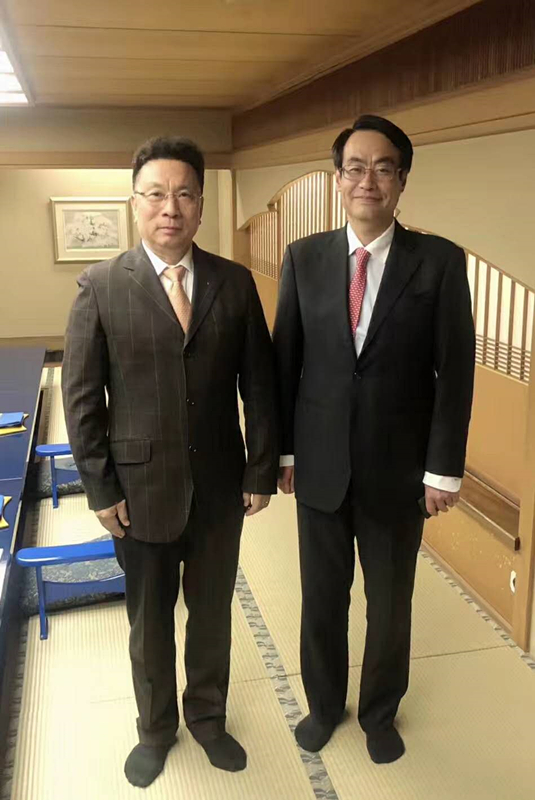
Chairman Li Jianjun visited Tokyo, Japan, and negotiated friendly relations with officials of the Ministry of Economy, Trade and Industry of Japan
2019-03-27
Recently, Mr. Li Jianjun, the chairman of our group, had a friendly conversation with officials from the Ministry of Economy, Trade and Industry of Japan on cooperation in the industrial fields. The Ministry of Economy, Trade and Industry of Japan is affiliated to the Central Government Department of Japan, and its predecessor is the Ministry of International Trade and Industry. It is responsible for improving the vitality of the private economy, ensuring the smooth development of foreign economic relations, ensuring the development of the economy and industry, and stabilizing the supply of mineral resources and energy and maintaining efficiency.

Looking at the development of Sino-Japanese relations in recent years, we found that:
First, pragmatically put the first place: a number of consensuses in the economic field
The People's Bank of China announced on October 26, 2018 that with the approval of the State Council, the People's Bank of China and the Bank of Japan signed a bilateral exchange agreement between China and Japan to maintain financial stability and support bilateral economic and financial activities. This is the resumption of the currency swap agreement between China and Japan after a lapse of five years. "From the perspective of bilateral trade and investment relations, the scale of this currency swap is reasonable, and there is still the possibility of further expansion in the future, which is conducive to avoiding the exchange rate risk of the US dollar." In addition to restarting the currency swap agreement, China The People's Bank of China also announced that it has signed a memorandum of cooperation with the Bank of Japan to establish a RMB clearing arrangement in Japan. According to the relevant content of the memorandum, the People's Bank of China decided to authorize the Bank of China Tokyo Branch to act as the Japanese RMB business clearing bank.
The People's Bank of China said that the establishment of Japan's RMB clearing arrangement will facilitate the use of RMB for cross-border transactions by Chinese and Japanese companies and financial institutions, and further promote bilateral trade and investment facilitation. These cooperation will help bilateral trade and investment between China and Japan. Further growth. In addition to the currency sector, the two sides reached an agreement on further promoting capital market cooperation. The China Securities Regulatory Commission and the Japan Financial Services Agency signed a memorandum of understanding to promote cooperation in the securities market between the two countries. The exchanges and industry associations of the two countries also signed a memorandum of understanding to strengthen cooperation.

Second, Sino-Japanese cooperation enters the "new era"
Sino-Japanese economic and trade relations are moving from bilateral to third parties, and they are implemented in details and implementation. Deepening third-party cooperation is conducive to the complementarity of Sino-Japanese industry, investment and trade, avoiding vicious competition, giving play to the advantages of their respective fields, engaging in dislocation competition and product complementarity, and facilitating mutual benefit.
In the past, Japan’s political circles have made great changes to China’s “One Belt, One Road” initiative, and have gone through the process of criticizing and opposing, waiting and seeing, and then participating. After research, the Japanese side found that this initiative is in the interest of the Japanese economic community. Participating in it is also conducive to opening up emerging markets and leading the growth of trade and investment.
Judging from the results achieved so far, economic cooperation, that is, pragmatic cooperation is clearly in the first place. Japan has put forward the principle of cooperation with third-party markets in China and Japan in advance, that is, full market operation, etc., indicating that the principle of commercial interests is still emphasized. This also shows that the 'One Belt, One Road' cooperation has changed from a slogan to a practical action. This is a major step forward in the pragmatic cooperation between China and Japan. ”

The future trend of Sino-Japanese relations is that cooperation and competition, dialogue and confrontation exist simultaneously. Japan is willing to take a share of China's development and recognize the trend of free trade, but competition is also a reality, such as the field of high-speed rail and defense. policy. One of the characteristics of Sino-Japanese relations in the new era is the coexistence of the aforementioned two pairs of contradictions.
During this meeting, we and the Ministry of Economy, Trade and Industry officials exchanged discussions on the world economic situation, the country's macroeconomic situation, supply-side structural reform, third-party market cooperation, foreign investment and foreign investment, and discussed Cooperation in the fields of service industry, energy conservation and environmental protection, and energy. The two sides unanimously stated that they should further strengthen communication and pragmatic cooperation and play a positive role in the in-depth development of Sino-Japanese friendly relations.
